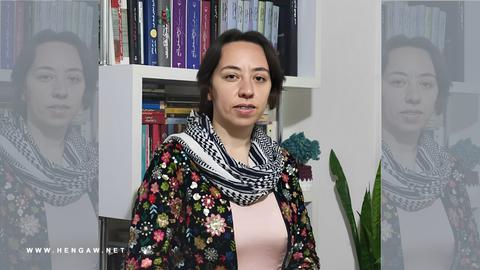Farinaz Lari became the first Iranian woman to ever win world kickboxing championships, first in 2011, and then in 2013. But in 2015, Iran’s Kickboxing Association informed her she would not be allowed to attend to the world championship in Spain, which took place from November 3 to November 8, 2015.
Lari has lived in Canada since 2010, and became a Canadian citizen a few years later. Because her contract with the Iranian women’s team had come to an end in 2013, when she became a Canadian citizen, she took steps to join Canada’s national women’s kickboxing team. But soon she discovered that she needed a letter from Iran’s Kickboxing Association to confirm it was fine with her decision to play for Canada. “I called them, but they lied to me. They told me, due to lack of loyalty, I would face suspension for two years. I had already been suspended between 2013 to 2015. But when I told this story to the president of the Canada Kickboxing Federation, I discovered there is no such a rule. They just made it up to sabotage my career. ”
Lari says 2015 was her “worst year” because she finally recognized the extent to which the Iranian Kickboxing Association undervalued and dismissed the women’s team. “There were two important championships in 2015, the Asian and the world championships. Iran’s Kickboxing Association contacted me to play for them, but I refused. I didn’t want to play for Iran any more — they care about the men’s team, and not at all about the women’s. Compared to some men in the team, I achieved more success, but I never felt respected or appreciated.”
The Canadian Kickboxing Federation tried to help, and even contacted the World Kickboxing Organization to see what it could do, but all attempts to get her to on the Canadian team failed. As a result, Farinaz Lari was unable to take part in the world championship.
All this happened, she said, because of her gender. “They treat me like this because I am a woman. I can see what it’s been like for my husband, who has played 11 years for the national team and never had any issue. They always respected him because of his gender, while the situation has been the opposite for me.”
A Committed and Driven Athlete
Lari first took part in international championships as a member of Iran’s national women’s kickboxing team at the Asian Indoor Games 2009 in Vietnam, where she won a silver medal. “Because I was the first Iranian woman to ever reach the final, Mahmoud Ahmadinejad was there to watch my game,” she told IranWire.
In the following years, Lari went on to achieve even greater success: the 28-year-old won the gold medal in the World Cup Diamond-2011, and then second place in the Asian Championships-2012 in India. In 2013, she won the World Championships in Brazil. Soon after, her contract with the national team expired, though she was never given a reason why.
Lari began her athletic career when she was a teenager. “I was good in gymnastics too. I had a very good coach, who told me that if I wanted to continue as a professional and take part in world games, I should leave gymnastics and pursue other sports, because female gymnasts aren’t and won’t be successful in Iran. She also advised me that my gymnastic background would help me in the future.”
“I always liked martial arts and my favorite was taekwondo, but my parents didn’t let me do it,” Lari said. “They believed that martial arts were not suitable for girls and it would have a bad effect on my education.”
So she had to wait. When she was 18, Lari got her first paid job and enrolled in a kickboxing class.
From then on, she took classes in Tehran and began to train in earnest. Her parents grew to understand her love of kickboxing and supported her. She had been training for a year when she decided to hire a personal trainer, Ali Khanjari, the captain of Iran’s men’s national kickboxing team. “I wanted to be successful in this field, compete globally and be a member of the national team,” she said. “So I decided I had to get a good coach. People said that Ali Khanjari was the best.” Khanjari was the most experienced member of Iran’s national team, and won European and Asian championships during his 11-year career.
“Ali Khanjari trained me at my home, while my father was with us,” Lari said. “My father converted a part of our house so I could practice. Many people think that Iranian female athletes can’t have a male coach, but some members of the national team do train with male coaches. We always wore hijab, as we do when we play in international games.” Iranian female athletes are only allowed to take part in international competitions if they fully cover both their heads and bodies.
Later, Khanjari and Lari married.
Then, in 2010, Lari and her family moved to Canada, though Khanjari stayed in Iran to continue coaching and pursue his career. “My parents had wanted my three sisters and me to study abroad. So they applied for us to immigrate to Canada in 2002. Our application was accepted in 2008, when I had just finished my undergraduate degree in mathematics at Azad University. My elder sister was doing her Master’s degree in the UK. So we eventually moved to Vancouver in 2010. At the time, I was still part of Iran’s national team.”
Since her husband — who was also still her coach — was still in Iran, she traveled back to the country every four or five months.“My husband moved to Canada in 2012,” Lari said. He still plays for Iran’s national team,” she told IranWire.
While in Canada, she practiced at a local sports club without wearing hijab, but when she played for the national team, she always wore one. “I have been told I should avoid posting photos of myself not wearing hijab on social media. I have followed this advice to prevent any problems.”
Though Farinaz Lari’s contract with Iran’s national team terminated in 2013, she said that at the time it did not have an impact on her career. “There were not many significant games in 2014. They didn’t contact me when my contract finished, so I thought that my time playing for the national team was over. Anyway, by that time, I was Canadian citizen and wanted to play for Canada’s national team.” But then, of course, Iranian kickboxing officials blocked her from pursuing the sport in Canada in the way she wanted.
Although she was unable to play for the Canadian national team, Lari hasn’t given up her dream. “At the end of 2015, I played as a Canadian in an international games in Italy and won. After that, I played in Thailand, and the president of the World Muay Thai Organization was watching the game. He came up to me after the game and asked about my situation and where I lived. He promised me that I’ll be able to play in the Muay Thai team, since I had not played for Iran’s Muay Thai team.” Muay Thai is also known as Thai Kickboxing, and is considered a combat sport, but is also used in Mixed Martial Arts.
This was some good news in a disappointing and frustrating year for Farinaz Lari. With plenty of support from international sporting bodies and fellow players, she is determined not to give up. She will continue to fight for her right to compete in international championships, and to show Iran’s Kickboxing Association how unjust and wrong it has been about her, and about female athletes in general.
Related Articles:
The Woman who Ignored all the Stop Signs
How Iran's Laws Discriminate Against Women
Women in Sport: Are Things Looking up?
visit the accountability section
In this section of Iran Wire, you can contact the officials and launch your campaign for various problems































comments